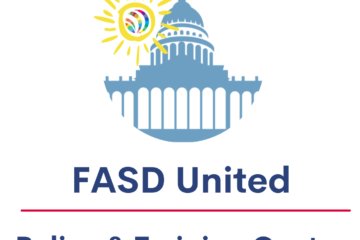UPDATE (2/17/23): The updated version of the bill passed through the Senate with a vote of 46 to 1 in favor. It will be discussed in the House of Representatives in the coming days.
UPDATE (2/16/23): An updated version of this bill has been introduced. With the revisions there will no longer be changes to the definition of “special education” and “student with a disability”. The bill also no longer includes language on screening individuals for FASD in the juvenile court system.
Replacing the FASD Council is a Cross-disability advisory council, the language of which was taken from a separate, unrelated bill previously introduced in North Dakota. This council would be responsible for discussing strategies to address the needs of individuals with disabilities.
The revised legislation would not mandate new foster parents to undergo FASD training, instead opting to integrate FASD informed instruction into the existing training curriculum. It also calls for a formal FASD screening process for those in the foster care system.
UPDATE (2/14/23): Click here to read to an article from KX News in North Dakota with quotes from FASD ND’s Carl Young.
The Legislative Assembly of North Dakota has introduced a bill that could have a direct positive impact on individuals with FASDs and their caregivers, as well as the systems of care they rely on. Senate bill #2335, introduced by State Senators Kristin Roers, Judy Lee, and Dick Dever and Representative Nelson Beltz, seeks to amend multiple definitions related to FASD and education, include FASDs as a “developmental disability”, ensure that the juvenile court system assesses children for FASD in order to better address their needs, create an FASD council, and to mandate FASD training for foster parents.
By amending definitions through this bill, an individual with an FASD would be considered a “student with a disability”, which would qualify them for transportation, developmental, and supportive services that would allow them to benefit from special education programs. The inclusion of FASDs as “developmental disabilities” confirms the recognition of care required for individuals, which will potentially lead to more services being offered in the FASD realm. In 2022 California signed into law a similar bill adding FASD as a qualifying condition for special education, expanding the services offered to individuals with FASDs.
This bill would require the director of a juvenile court to assess each child in need of services or protection for FASD. This screening could potentially keep children out of the juvenile justice system and ensure they receive the supports they need. FASD United recognizes the need for major change within the justice system as it pertains to FASD, and this level of advocacy from within the system would be a welcomed change. Alaska has previously passed legislation qualifying FASD as a mitigating factor in criminal sentencing. A 2014 bill also from Alaska increased the capability of rapid FASD assessment within the Department of Corrections and Department of Health and Social Services.
The FASD Council created by this bill would be charged with examining early intervention and family support services, workforce development programs, programs allowing individuals to receive support in the least restrictive environments possible, and federal resources providing services. This council would be made up of government officials and state employees, but would also employ the services of a pediatrician, college faculty, behavioral specialist, representative of a residential care facility, a member of a federally recognized Indian Tribe, an adult self-advocate, and four parents of a child with FASD. FASD United fully supports the inclusion of self-advocates, caregivers, and members of Indigenous Nations as it shows a willingness to be as inclusive as possible while valuing lived experience.
The final amendment proposed in this bill would require foster parents to complete a course of instruction related to FASD. There is precedence for such training, as Minnesota passed a bill in 2015 requiring paraprofessionals in educational settings to receive specific disability training related to the populations they serve. One year later, in 2016, Minnesota passed another bill requiring foster parents to receive training on FASD. This is an important step in spreading awareness of FASD as children with FASDs are disproportionally represented in the foster care system.
If you are looking for ways to support this effort and efforts like it in your state, we urge you to stay connected to FASD United and our Policy Center. Leading the effort in North Dakota is FASD United Affiliate member, FASD North Dakota (FASD ND). Carl Young, FASD ND Executive Director is hopeful this piece of legislation will lead to change, stating “This piece of legislation is the first in nearly 20 years to address the specific needs of the FASD community in North Dakota. The legislation as introduced is a combination of 4 bills that were drafted by our team and a fifth that was drafted by a member of a statewide advocacy organization”. Carl is also pleased with other developments in North Dakota, asserting that “the State Council on Developmental Disabilities has adopted FASD as its focus for the next 5 years. This is significant, as it gives our agency one more collaborative partner to strive forward with building a community that is inclusive to all of our children”. Read Carl’s full statement below.
This piece of legislation is the first in nearly 20 years to address the specific needs of the FASD community in North Dakota. The legislation as introduced is a combination of 4 bills that were drafted by our team and a fifth that was drafted by a member of a statewide advocacy organization.
In North Dakota we are facing a crisis stage with lack of foster homes for kids. Our schools are being inundated with students who are seen as behavioral, when in fact most are presenting symptoms of some type of disability. It was our hope in drafting this legislation that each of these issues would begin to be addressed. Through the legislation we can begin to educate professionals and parents alike about the unique needs the disability presents.
Throughout North Dakota, we are seeing significant numbers of kids born substance exposed to drugs and alcohol. With alcohol being the far more damaging drug of choice. I use the example of a classroom setting. The average classroom in North Dakota, statewide, is around 25 students. Of course, in our rural communities they are smaller, but overall the average is 25. This means that with a rate of 1 in 20 kids being affected, every classroom in North Dakota has 1 child that is likely undiagnosed with this Developmental Disability. In our First Nation communities the number is significantly higher at a rate of 1 in 17. Too often our kids end up in the “School to Prison” pipeline. This legislation will hopefully begin to allow this issue to be addressed. In our state, the State Council on Developmental Disabilities has adopted FASD as its focus for the next 5 years. This is significant, as it gives our agency one more collaborative partner to strive forward with building a community that is inclusive to all our children.
To download a copy of the bill, click here: original language


2 Comments
Multifaceted FASD Legislation Introduced in Washington State – FASD United Policy And Training Center · February 13, 2023 at 2:06 pm
[…] July 2024, with a final strategic plan being introduced by July 2025. Most recently, we have seen legislation introduce in North Dakota that would create a FASD council like the group in this […]
Legislation Introduced In New York to Include FASD as Developmental Disability – FASD United Policy And Training Center · February 13, 2023 at 4:13 pm
[…] alcohol syndrome, and alcohol-related neurodevelopmental disorder. 2023 has already seen similar legislation introduced in North Dakota, where the State Senate seeks to include FASDs in the definition of developmental disability as […]
Comments are closed.